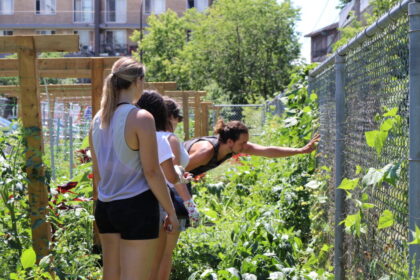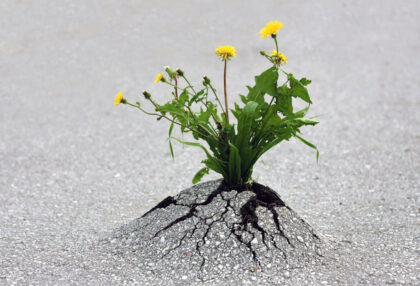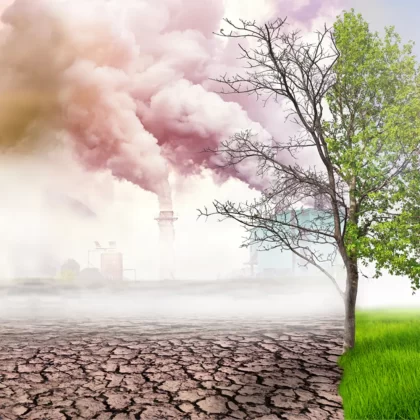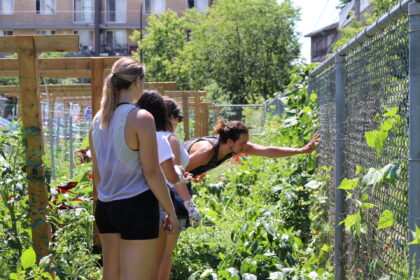
Description
Welcome to Urban Agriculture
Important Updates
I revised the due dates to accommodate you all after the student strikes.
Blog 2 is now due on April 8th.
The final project is now due on April 22nd in hard copy in my mailbox. You must submit the group assignment and individual assignments in one package.
On April 15th, we will hold class at Loyola campus at the farm. I will send everyone an email with directions. On April 10th, we will meet in the regular classroom.
Classes
Course Information
Day/Time: Monday and Wednesday 11:45 AM – 1:00 PM
Office Hours: Mondays and Wednesdays 1:00 PM– 2:00 PM (by appointment only)
Office Location: H 558
Classroom: H 557 SGW
Territorial Acknowledgement
I acknowledge that Concordia University is located on unceded Indigenous lands. The Kanien’kehá:ka Nation is recognized as the custodians of the lands and waters on which we gather today. Tiohtiá:ke/Montreal is historically known as a gathering place for many First Nations. Today, it is home to a diverse population of Indigenous and other peoples. We respect the continued connections with the past, present and future in our ongoing relationships with Indigenous and other peoples within the Montreal community. (Indigenous Directions Leadership Group, Feb. 16, 2017)
Course Description from Undergraduate Calendar
This course examines the history and practice of producing food in cities. Students will explore the tensions between the politics, economies and ecologies that organize urban food production and the everyday ways people raise and access food in varied urban contexts. The course also critically evaluates food‑based social movements: their limits, possibilities and connections to wider struggles for socio‑economic justice.
Learning Outcomes
By the end of the course, students should be able to…
- Understand theoretical and practical approaches to urban agriculture
- Situate urban agriculture into larger food systems
- Identify planetary boundaries and ecological crises caused by industrial agriculture
- Understand the strengths and limitations of urban agriculture
- Differentiate between different models of urban farms/gardens
- Apply diverse economic approaches to imagine and create ethical foodscapes
- Map community food systems economies
- Move beyond understanding weak sustainability toward transformative approaches
- Understand social justice and decolonial perspectives in urban agriculture
- Grow food in urban (or peri-urban) environments
- Incorporate SPIN (Small Plot Intensive Farming) methods
- Become more self-sufficient by producing a variety of fruits and vegetables at home or in the community
- Understand community food systems and apply the knowledge to urban gardening/farming
- Run a social economy-based urban farm
- Cultivate annual and perennial food plants
- Incorporate permaculture and agroecology methods into urban gardening/farming
- Get the most production in an urban garden/farm
- Understand gardening cycles – what to do in different seasons
- Incorporate mushrooms into your urban farms/gardens
- Forage in urban areas
- Use natural methods for pest control
- Distinguish between weeds and beneficial plants and flowers
- Recount the history of the urban agriculture movement in Quebec and Canada
- Perform action research and incorporate ontological approaches in creating community food sovereignty and food justice
Instructional Method
This course will be given in person. Each class will begin with a short lecture and discussion led by Erik Chevrier, Ph.D. He will introduce themes, provide additional examples and/or offer critical perspectives related to the weekly topics but not covered in the readings. The course will also include a variety of pedagogical styles, including lectures, discussions, guest speakers (possibly), field trips (maybe), community service learning and/or experiential learning. Students are expected to read the required texts before class and engage with each other through interactive activities and critical discussions.
Required Course Material
Students are required to complete the weekly readings before coming to class. Most of the readings are made available at the Concordia library in e-version via links provided in this syllabus. Students are also encouraged to read one of the following three books:
1 – Braiding Sweetgrass: Indigenous Wisdom, Scientific Knowledge, and the Teachings of Plants
2 – A Foodie’s Guide to Capitalism: Understanding the Political Economy of What we Eat
3 – Agroecology and Regenerative Agriculture: Sustainable Solutions for Hunger, Poverty and Climate Change
4 – Agroecology Now! Transformations Towards More Just and Sustainable Food Systems
Course Schedule | ||||
Week | Date | Class Topics | Assignment Due | Readings and Assignments Due |
1 | January 15 – 17 | Introduction to Course | ||
2 | January 22 – 24 | Introduction to Urban Agriculture and Food Systems | Regenerating Food Systems: A Socio-Ecological Approach Integrated Urban Agriculture: Precedents, Practices, Prospects Chapter 7 – Agricultural Urbanism: Building Sustainable Urban and Regional Food Systems for 21st Century Cities | |
3 | January 29 – 31 | Sustainable Urban Agriculture | Beyond Culturally Significant Practices: Decolonizing Ontologies for Regenerative Food-SystemsEntanglements of Social Justice, Sustainability Governance and Land Tenure: A Literature Review | |
4 | February 5 – 7 | The Economy of Urban Agriculture | A Political Economy for Regenerative Food Systems: Towards an Integrative Research Agenda | |
5 | February 12 – 14 | Urban Food Sovereignty and Justice | Read one of the following chapters: Urban and Regional Agriculture:Building Resilient Food SystemsCommunity-Based Urban Agriculturefor Food Justice: A Review | |
6 | February 19 – 21 | Urban Agroecology | From Agroecology to Food Systems Sustainability: An Evolutionary Path Shifting Toward Sustainable Agriculture and Development
Producing Urban Agroecology in the East Bay: From Soil Health to Community Empowerment | |
February 26 – 28 | Reading Week | |||
7 | March 4 – 6 | Urban Permaculture | Blog 1 Due March 4 | |
8 | March 11 – 13 | Urban Food Planning | Urban Food Planning: A New Frontier for City and Regenerative Food System Builders Integrated Urban Agriculture: Precedents, Practices, Prospects Chapter 4 – Designing Urban Agriculture Forms: History, Education, Proposals and Projects Chapter 5 – Urban Agriculture Linkages, Patterns, Education and Urban Planning Chapter 6 – Resilient Cities = Carrot City: Urban Agriculture Theories and Designs | |
9 | March 18 – 20 | Annual Food Production | Various Chapters of: Carpenter, N., and Rosenthal, W. (2011) The Essential Urban Farmer, Penguin Books. Gaia’s Garden: A Guide to Home Scale Permaculture | |
10 | March 25 – 27 | Perennial Food Production | Various Chapters of: Carpenter, N., and Rosenthal, W. (2011) The Essential Urban Farmer, Penguin Books. Gaia’s Garden: A Guide to Home Scale Permaculture | |
11 | April 3 – 8 | Indoor Fruit and Vegetable Production | Blog 2 Due April 3rd | Various Chapters of: Carpenter, N., and Rosenthal, W. (2011) The Essential Urban Farmer, Penguin Books. Gaia’s Garden: A Guide to Home Scale Permaculture |
12 | April 10 – 15 | Food Preservation, Seed Saving, Composting | Various Chapters of: Carpenter, N., and Rosenthal, W. (2011) The Essential Urban Farmer, Penguin Books. Gaia’s Garden: A Guide to Home Scale Permaculture | |
April 22 | Final Project Due | |||
Assignments
Name of Assignment | Due Date | % of final grade |
Blog 1 – Critical Perspectives in Urban Agriculture | February 19th | 30% |
Blog 2 – Creating Sustainable Urban Foodscapes | April 3rd | 30% |
Final Project | April 22th | 30% |
Participation | Ongoing | 10% |
Assignment Descriptions
Participation: The participation grade is based on attendance, involvement in discussions, participation in classroom activities and supplemental tasks. Every class, students must demonstrate that they have completed the course readings.
Blog Posts (Essays about Urban Agriculture): Students will write two blogs of about 600 – 1000 words about a topic related to urban agriculture covered in the course lectures and/or required readings. The first blog must include themes related to critical perspectives in urban agriculture, and the second blog must include topics related to creating sustainable urban foodscapes. Although this is a blog, the information conveyed must come from research, not conjecture. In addition, to get an A, the blog must contain at least eight reliable, valid, credible sources and reference the course readings. Students with production skills can produce a video or a podcast instead of a blog; however, this must also be approved by me (Erik Chevrier).
Final Project: Students will engage with the community to improve local foodscapes through the final course project. Students may get involved with initiatives Erik works with (Lachine Farms, CultivAction, etc.). Students can also work with another urban agriculture project in their local communities.
Grade to Letter Equivalencies
A+ | 95 – 100 | B+ | 80 – 84.9 | C+ | 67 – 69.9 | D+ | 57 – 59.9 | F | 0 – 49 |
A | 90 – 94.9 | B | 75 – 79.9 | C | 63 – 66.9 | D | 53 – 56.9 | NR | No report |
A- | 85 – 89.9 | B- | 70 – 74.9 | C- | 60 – 62.9 | D- | 50 – 52.9 |
Extraordinary Circumstances
In the event of extraordinary circumstances and pursuant to the Academic Regulations, the University may modify the delivery, content, structure, forum, location and/or evaluation scheme. In the event of such extraordinary circumstances, students will be informed of the changes.
Class Cancellation
Classes are officially considered cancelled if an instructor is 15 minutes late for a 50-minute class, 20 minutes late for a 75-minute class, or 30 minutes late for longer classes.
Intellectual Property
Content belonging to instructors shared in online courses, including, but not limited to, online lectures, course notes, and video recordings of classes remain the intellectual property of the faculty member. It may not be distributed, published, or broadcast, in whole or in part, without the express permission of the faculty member. Students are also forbidden to use their own means of recording any elements of an online class or lecture without express permission of the instructor. Any unauthorized sharing of course content may constitute a breach of the Academic Code of Conduct and/or the Code of Rights and Responsibilities. As specified in the Policy on Intellectual Property, the University does not claim any ownership of or interest in any student IP. All university members retain copyright over their work.
Behaviour
All individuals participating in courses are expected to be professional and constructive throughout the course, including in their communications. Concordia students are subject to the Code of Rights and Responsibilities which applies both when students are physically and virtually engaged in any University activity, including classes, seminars, meetings, etc. Students engaged in University activities must respect this Code when engaging with any members of the Concordia community, including faculty, staff, and students, whether such interactions are verbal or in writing, face to face or online/virtual. Failing to comply with the Code may result in charges and sanctions, as outlined in the Code.
Late Assignment and Submission Policy
Unless you are given permission in advance, late assignments will not be accepted without adequate documentation of medical or personal emergencies. All assignments must be submitted in hard copy on the due date. Assignments that are received electronically will have 30% deducted from the grade of the assignment.
Academic Integrity
Academic integrity means that every student must be honest and accurate in their work. The Academic Code of Conduct includes rules and regulations students must follow. Unacceptable practices include the following
- Copy from ANYWHERE without saying from where it came.
- Omit quotation marks for direct quotations.
- Let another student copy your work and then submit it as his/her own.
- Hand in the same assignment in more than one class without permission.
- Have unauthorized material in an exam, such as cheat sheets, or crib notes. YOU DON’T HAVE TO BE CAUGHT USING THEM – JUST HAVING THEM WILL GET YOU INTO TROUBLE!
- Copy from someone else’s exam.
- Communicate with another student during an exam by talking or using some form of signals.
- Add or remove pages from an examination booklet or take the booklet out of an exam room.
- Get hold of or steal an exam or assignment answers or questions.
- Write a test or exam for someone else or have someone write it for you.
- Hand in false documents such as medical notes, transcript or record.
- Falsify data or research results.
PLAGIARISM: The most common offense under the Academic Code of Conduct (see link below) is plagiarism, which the Code defines as “the presentation of the work of another person as one’s own or without proper acknowledgement.”
This could be material copied word for word from books, journals, internet sites, professor’s course notes, etc. It could be material that is paraphrased but closely resembles the original source. It could be the work of a fellow student, such as an answer on a quiz, data for a lab report, or a paper or assignment completed by another student. It could be a paper purchased through one of the many available sources. Plagiarism does not refer to words alone. It can also refer to copying images, graphs, tables, and ideas. Plagiarism is not limited to written work. It also applies to oral presentations, computer assignments and artistic works. Finally, if you translate the work of another person into French or English and do not cite the source, this is also plagiarism. In simple words: DO NOT COPY, PARAPHRASE OR TRANSLATE ANYTHING FROM ANYWHERE WITHOUT SAYING FROM WHERE YOU OBTAINED IT!
Take care to inform yourself of the rules, regulations and expectations for academic integrity.




